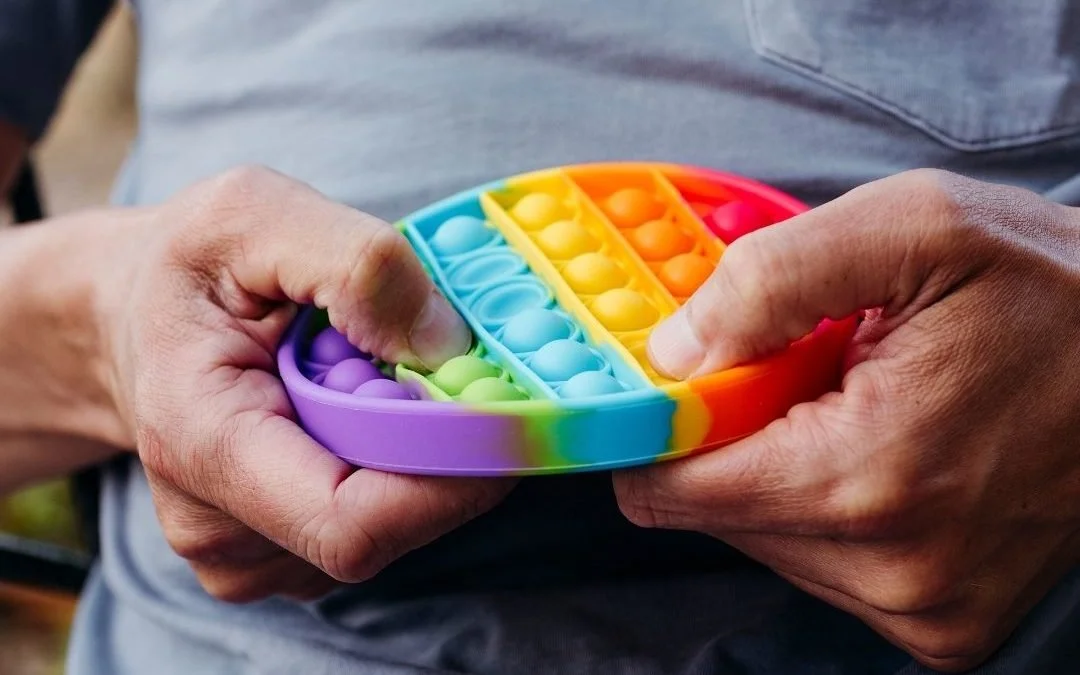Discovering ADHD in Adulthood: One Therapist’s Journey Towards A Neurodivergent-Affirming Life
By Casey Harvey, LCSW (Wildflower therapist and eating disorder specialist)
I am well into my 30s, but this October feels like my first birthday again. Not because of diapers or smash cakes, but because I am learning myself all over again. October is ADHD Awareness Month, and also marks the beginning of recognizing myself as a neurodivergent person. My diagnosis has been life-changing in every sense. It has been equally joyous and heartbreaking, liberating and infuriating. I feel capable, understood, and pissed off. It's hard to resist the wormhole of how life would have been different with an earlier diagnosis.
Unfortunately, this is so common. The average age of ADHD diagnosis for women is around 35, while for men it’s estimated to be between 7 and 9 years old. This also only applies to white men and women—Black women are the least likely population to be diagnosed with ADHD, and are more likely to be misdiagnosed with conduct disorder or oppositional defiant disorder. This results in the harmful belief that these struggles are intentional and makes it much harder to access support.
Normalizing the Adult ADHD Experience
I share about my journey to normalize and validate this experience, and to encourage those with questions about their own neurotype to know that these deserve fair and unbiased assessment. My journey to diagnosis was entirely serendipitous.
While searching for a new psychiatrist due to a simple insurance change, I was matched with the provider who would be the first to ask me if I had ever been tested for ADHD. This was the fifth psychiatrist I had seen in my life, and no, I had never even thought about it. Sure, I had seen some TikTok videos that felt relevant to me about ADHD- but doesn’t everybody? And isn’t self-diagnosis a huge issue anyway? Doesn’t everybody think like me?
My symptoms as an adult were hard for me to catch because I could explain them away as other things. Maybe I’m not focusing because I’m anxious. Maybe I’m not doing things because I’m depressed. Or maybe I really am lazy.
My perception of my own shortcomings caused me to frequently ignore what these moments felt like, until they were reflected back to me. Yes, I guess it did feel bad to have a free day with a few small tasks, then have panicked thoughts about when the exact right time to do these tasks was, then spend most of the day sitting in my desk chair scrolling on my phone and feeling like a failure. I guess it wasn’t lazy to spend hours of intense effort thinking about the best way to do something, even if I didn’t do it.
The Privilege of Being Seen
Being diagnosed as an adult required levels of privilege. I had the right psychiatrist, who saw me and noticed me in the first place. I had time and flexibility for our appointments, and the resources to pay for them.
Diagnosis for me also required family members to complete a survey to ensure that symptoms were present before the age of 14 (“Of course, you don’t have ADHD, you never got in trouble at school!”). Despite their predictions, they were able and willing to participate-a privilege not available to many adults.
After being diagnosed, the past year has been focused on learning how to do things in a way that works with the strengths and weaknesses of the brain that I have. It feels like years of having a car that doesn’t run quite right, only to be told suddenly that you actually have a manual engine-you were just driving it like an automatic.
My Takeaways After One Transformative Year
1. Alternative Roads to Pursuing a Diagnosis Deserve to Be Taken Seriously
I don’t think it will be long until a psychology textbook somewhere uses the phrase “TikTok diagnosis.” There is an incredible amount of judgment and discussion about the role of self-diagnosis and online ADHD communities. While relating to a video or post is not the same as a diagnosis, I believe that it’s irresponsible to meet that experience with immediate skepticism and frustration.
The mental health system, like any system, is not free from the racism and misogyny of the world it was built in. Therefore, using the tools we do have-like online education, community stories, or platforms like TikTok-is a valid adaptation to a steeper climb.
If you are an adult questioning whether you may have ADHD, you deserve a fair, trauma-informed, and neurodivergent-affirming assessment-no matter what brought you there.
2. Understanding Is Powerful
It’s estimated that between 20% and 50% of people with ADHD also experience depression. The reasons vary, but the experience of feeling “wrong,” incapable, or different in a world that isn’t designed for you certainly doesn’t help.
ADHD treatment and neurodivergent-affirming therapy can take many forms. I’ve often had friends say things like, “But I don’t want to try medication, so it doesn’t matter,” when thinking about pursuing testing for ADHD. For some people, simply understanding their brain may be enough to feel permission to work differently-to release shame.
For me, there was nothing more powerful than seeing those words on a visit summary or seeing the score of an assessment that felt like it was jumping off the page. After years of feeling different, it was like someone saying: “Yes, you’re right-and different is fine. In fact, it’s pretty normal.”
This is close to my heart as an eating disorder therapist. Sometimes a diagnosis brings immense relief. Take Binge Eating Disorder, which is often unfairly labeled as “a lack of willpower.” Whether you are struggling with disordered eating or exploring ADHD, you deserve support from a provider who sees your whole story, not just the symptoms.
3. Do What Works
In the past year, my home has become ADHD-ified. My calendar is ripped into pages and hung up in one straight line, because if I can’t see it, it doesn’t exist (if you know, you know). We have timers in every room, reminders next to the coffee maker, and a spinning wheel for tasks when I can’t decide where to start.
Letting go of what “should” work for me and embracing what does has been freeing. This, to me, is the beauty of embracing neurodivergence-the recognition that there is no one “right” way to think, feel, or organize a life.
Finding Neurodivergent-Affirming Therapy in Philadelphia, PA
If you’re navigating ADHD, autism, or another form of neurodivergence as an adult, finding a neurodivergent affirming therapist in Philadelphia or the Main Line area can make all the difference. At Wildflower Therapy, our team specializes in neurodivergent-affirming and trauma-informed care, with clinicians licensed in Pennsylvania, New Jersey, Delaware, Virginia, Massechusetts, Vermont, Ohio, South Carolina, and Florida.
Whether you’re exploring a new diagnosis, managing executive functioning challenges, or working to untangle the overlap between ADHD and eating disorders, we offer a compassionate space where you don’t have to mask or apologize for how your brain works.
Learn more about our neurodivergent affirming therapists in Philadelphia, PA, and reach out to schedule your free consultation call for more information about if we would be the right fit!



